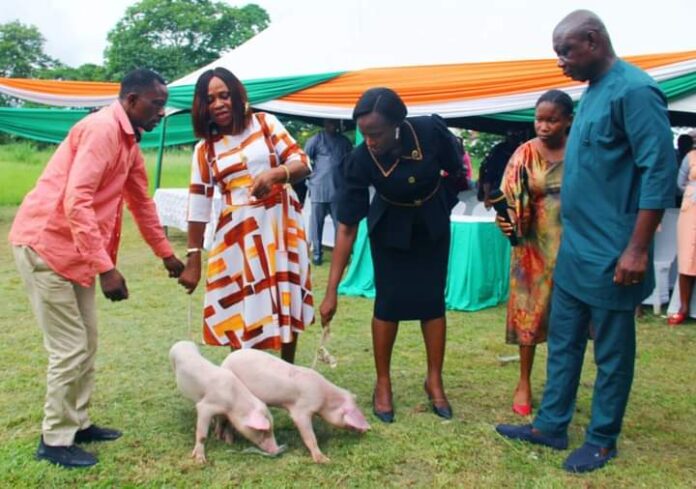Mrs Offiong Offor PhD, Commissioner for Agriculture and Rural Development, Akwa Ibom State,(middle) presenting piglets to pig farmers.
By Ukpong Ukpong
Based on significant efforts made by government to drive policies on agriculture, Akwa Ibom State is one season away from averting severe food shortage, meeting demand for staple food and if the current drive is sustained, then could achieve food security.
Food security is not a destination, but a journey of years attainable through consistent policy implementation, diligence in resource management and a lot of popular support. According to a consensus reached at the 1996 World Food Summit, food security is achieved when all people, at all times, have physical and economic access to sufficient, safe and nutritious food that meets their dietary needs and food preferences for an active and healthy life.
By this definition it is clear that all hands must be on deck. Government will provide the policy framework that will create access to resources, but must rely on citizens to make use of these resources to produce food for everyone. The uncontrollable price hike of staple food in Nigeria worsening discontent among citizens and putting government under immense pressure happened because collectively Nigerians, over the years, became complacent, relegating food production to so-called food zones which struggled to carter for a population of over 200 million.
Also, despite alarm of impending food crisis raised by victims of islamist insurgents, Fulani herders and militants, who began raiding farm communities, burning farmlands and killing wantonly as far back as 2002, several states did not realise they must act decisively and fast to address impending food scarcity and curb growing threat to national cohesion and security. Many were playing ethno-religious politics with these existential threats, perhaps thinking they will be left unscathed.
On the contrary, Akwa Ibom state government foresaw these difficult times and began considering practical measures to ensure food availability since 2015. The then administration, working through the Ministry of Agriculture, the Bureau of Technical Matters and Due Process – Office of the Governor and the Technical Committee on Agriculture and Food Sufficiency set up structural frame work to ensure food availability. They all did their best in making food available yet food security remained elusive because agriculture was still viewed as a component rather than the entire engine for stability and development.
Now, Governor Umo Eno has decided to make agriculture the flagship of his administration’s development agenda. This shift in focus provides the needed political will to drive Akwa Ibom towards food security and real development. But, be warned that harnessing agriculture to meet our nutrition requirements and propel industrialisation will not be a walk in the park. We should carefully study crops and livestock we plan to mass produce, understand their value chain as well as their global market value if we intend to export eventually. So, beyond the optimism that greets the back-to- farm initiative there is the great task of actually getting our hands dirty on the farm.
READ: A’Ibom community sends SOS to Gov Eno over erosion menace
On that note, the Ministry of Agriculture and Rural Development plays a vital role in actualising this policy, considering its mandate to galvanise resources and expertise towards food production in the state. It has the wherewithal to develop templates in dealing with farm groups and supervise farming across the state. As a body, statutorily responsible for overseeing this critical sector, it must be equipped to perform its mandate. Staff of the ministry ought to be trained continually and updated on evolving technologies in smart farming practices and sustainable agriculture.
It is this Ministry, not some ad-hoc committee, that should be in charge of interpreting the governor’s vision for the sector and champion ongoing campaign to make food available to every Akwa Ibom citizen. Recall that the last administration tried using ad-hoc committees to get things done but failed, whereas the Ministry has experts in all related fields to deliver.
For instance, in 2015 the Bureau on Technical Matters and Due Process domiciled in the Governor’s Office created Akwa Ibom Enterprise and Employment Scheme, AKEES, which spearheaded the vegetable revolution that ensured more that 80% vegetables consumed in the State were produced locally, but it eventually lost focus and never reached its objective of creating farm hubs and agro-based industries. Also, the Technical Committee on Agriculture and Food Sufficiency was established with so much promise, but with very little success.
For Akwa Ibom state to achieve food security, the Ministry of Agriculture and Rural Development is the key. All it needs is to look into four major areas of need namely physical availability of food, access to food (economic and physical access), utilisation of available food and then sustainability of the already mentioned areas of need.
Accordingly, the back-to-farm initiative should be made to address apathy of our people towards farming. There is need to use new technologies that will encourage people to farm. Farm inputs should be readily available and accessible to everyone not a selected few. More so, the Ministry should ensure loans and grants reach registered farm cooperatives not political farmers. It should endeavour to gather data from the field for analysis to aid decision making in future. Most importantly, there is need for accountability and probity.
Meanwhile, templates should be developed to train and engage undergraduates of the Faculty of Agriculture of the State University and other relevant tertiary institutions within the state as field agents or Agric extension officers to educate rural farmers on new techniques that guarantee high yield.
Furthermore, the Ministry should go beyond passive supervision of food production to actually engage relevant departments and agencies to ensure produce are actually delivered from our farms to our markets and not diverted to neighbouring countries and states. This has often been overlooked but, the truth be told, until we control produce export we will perpetually suffer food scarcity.
Verified information reveal that a chunk of garri produced locally or bought from Cross River State is ferried through our coastal communities to Cameroon by sea to avoid Customs on land borders, while rice find its way into the state through the same route. Similarly, vegetables, cocoyam, plantain, banana and other produce are rounded up and moved to Rivers and other states where their monetary value is tripled. This information should be investigated and action taken to put a check on this until when we have enough to eat.
In addition, the Ministry needs to identify crops suitable to our weather, soil type and meet our dietary needs. These are crops we have comparative advantage and best for our health since food utilisation is important to achieving food security.
According to health experts, sufficient energy and nutrient intake by individuals are the result of good care and feeding practices, food preparation, diversity of the diet and intra-household distribution of food. As laudable as the bulk purchase initiative is, it should focus on buying from our local farmers rather than importing food items. This way, they will be supported to grow into large-scale producers.
Good enough, the back-to-farm initiative of Pastor Umo Eno resonates among the political class. This engenders support for policy sustenance but let’s not be carried away because majority of the political elites view agriculture simply as fun getaway or prop for photo ops. The juice is therefore in the ability of the Ministry of Agriculture and Rural Development to translate this overwhelming support into actionable strategies that will spur all strata of our society to sowing seeds and nurturing them into produce.
At this point, it is expedient to applaud the quick-witted and pragmatic Commissioner for Agriculture and Rural Development, Dr. (Mrs.) Offiong Offor. She emulates the governor’s passion with remarkable brilliance and energy. She is personally pushing inputs to rural farmers directly in their communities rather than inviting them to Uyo as was often done in the past.
Also noteworthy is her responsiveness and accessibility. Recently, after this writer confronted her recently over delay in providing inputs to farm cooperatives as promised by the Ministry, she immediately sent a long explanation as follows:
“Morning Ukpong. We started sharing inputs to groups in March at the commencement of this planting season, and are still sharing inputs to farmers in batches. We ordered for improved varieties from the research institute and each person takes their turn to have them, as the demand for improved inputs are high.
“We have also shared to Public schools and Local government areas, who have farmers there. Just last week, we shared improved palm seedlings to groups in the palm belt. First planting season spans from March to July and farmers can still plant within these months.”
Already, the state is thinking head of setting up processing zones in expectation of bumper harvest at the end of this planting season and beyond. According to reports, government is set to partner with the African Development Bank on Special Agro-Industrial Processing Zones.
Offor believes this is necessary to facilitate the inclusion of the state in the second phase of the Special Agro-Industrial Processing Zones (SAPZ), a project aimed at developing agricultural value chain.
Such a forward thinking and diligent public servant is what this administration needs in order to actualise its goal of food security. Going forward, the governor’s focus on training youths, supporting workers and developing rural communities in driving his agricultural revolution is spot on.
In the same vein, by signing the Akwa Ibom State Agricultural Loans Law (Amendment) Bill into Governor Umo Eno has increased economic access to produce sufficient food. Now, individual farmers, corporate entities and cooperative societies can expand their operations, adopt modern farming techniques and increase production, ultimately contributing towards food security.
Considering these investments made by this administration, it does not matter if today cowpeas (bean) is N7,000 per 5kg custard pail – increased by 29% for the third consecutive time since last quarter or garri is N500 for two ‘mma efa’ cups or ‘foreign’ rice is N80,000 per 50kg bag while stone free rice is N56,000 for the same bag or tomato is N135, 000 per basket. There is hope that by the coming harvest, Akwa Ibom would have rolled away food scarcity and confidently march towards food security with determination and a sense of purpose.
Ukpong is Journalist, passionate about farming. He writes from his farmstead in Ikot Ntung, Nsit Ubium LGA. You can reach him through his mobile: +2348061214258 or email:ayenekponukpong@gmail.com
















